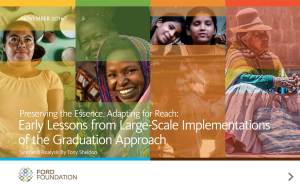Graduation Approach Synthesis Analysis
The Graduation Approach synthesis analysis provides an overview of the initial efforts of four programs (in Colombia, Peru, Ethiopia, and India) in scaling up the Graduation Approach. It focuses primarily on lessons learned that may be valuable for other institutions and agencies implementing, or considering implementing, a large-scale Graduation program.
The Graduation Approach has thus far shown strong promise of being adaptable enough for implementation at significant scale, both by governments and by NGOs. Challenges of course lie ahead in adapting the program design to suit local contexts, participant needs, and resource constraints. But the scale-ups documented in the four Ford Foundation-commissioned case studies indicate that such adaptations can be managed successfully; initial results are quite positive.
The experience of government-led Graduation programs has demonstrated that the approach can be successfully integrated into existing social protection initiatives, especially conditional cash transfer programs. Such an integrated strategy combines the breadth and depth of outreach that the existing programs already achieve with new and potentially life-changing economic opportunities for the populations served. The case studies show that government-implemented programs have already adapted and innovated on many elements of the “classic” Graduation Approach, often in response to the unique demands and constraints that publicly-funded initiatives face. This kind of experimentation presents important opportunities to deepen our understanding of how adaptable different elements of the Graduation Approach may be without sacrificing positive results.
Initial results from these four programs indicate that the Graduation Approach significantly changes the lives of participants. The incentive provided by the asset transfer, however modest, provides a much-needed capital infusion for the participants to build their businesses. In combination with the development of savings discipline and the technical training and life skills coaching, participants experience significant improvements in income, assets, and self-confidence. And after years of seeing themselves as poor and with little ability to change their circumstances, the Graduation program helps instill a sense of hope and self-esteem. It provides participants not only the opportunity to achieve gains in their family’s material well-being— but to see themselves on a pathway to a better future. Much work remains ahead to adapt, document, and share experiences about scaling up the Graduation Approach. These case studies represent one effort in that ongoing process.
CGAP and the Ford Foundation heartily hope that readers of these cases will contribute their perspectives and experiences to the Graduation Community of Practice’s online portal so that we can all continue to learn from one another’s work.
Download the full report here.
